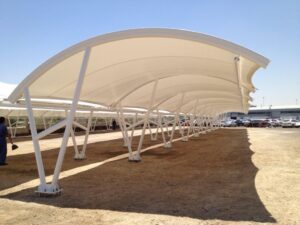Introduction
In recent years, Saudi Arabia has witnessed significant economic transformation driven by Vision 2030, a strategic framework aimed at reducing the country’s dependence on oil, diversifying its economy, and developing public service sectors. One of the offshoots of this transformation is a growing emphasis on flexible infrastructure solutions—especially in the form of mobile offices. These innovative workspaces are rapidly gaining popularity across the Kingdom, particularly in sectors such as construction, oil and gas, mining, telecommunications, and emergency services.
Mobile offices offer practical, cost-effective, and flexible alternatives to traditional brick-and-mortar buildings. Designed to be easily transportable and rapidly deployable, they provide all the essential features of a standard office while offering adaptability in remote or high-demand locations. This article delves into the evolution, advantages, applications, and future prospects of mobile offices in Saudi Arabia.
What Are Mobile Offices?
Mobile offices, often referred to as portable offices, are prefabricated structures equipped with standard office features such as desks, chairs, HVAC systems, lighting, electrical outlets, and communication infrastructure. They are typically housed within containers, trailers, or modular units that can be relocated as required. These offices are either wheeled or placed on a flat base and are designed to be durable, weather-resistant, and secure.
The designs vary from simple single-room setups to complex multi-room facilities that can include conference rooms, reception areas, storage spaces, washrooms, and even kitchenettes. The flexibility in design allows mobile offices to be tailored according to specific business or project needs.
Why Mobile Offices Are Gaining Popularity in Saudi Arabia
1. Support for Mega Projects
Saudi Arabia is currently home to some of the world’s most ambitious infrastructure projects, such as NEOM, the Red Sea Project, Qiddiya, and various industrial cities. These developments span vast desert landscapes where traditional infrastructure is either lacking or under construction. Mobile offices offer immediate solutions by providing on-site administrative spaces, enabling project managers, engineers, and consultants to operate efficiently without delay.
2. Rapid Urbanization and Population Growth
As cities like Riyadh, Jeddah, and Dammam expand rapidly, the need for temporary yet functional office spaces increases. Urban development projects, including transportation hubs, real estate developments, and commercial complexes, benefit from mobile offices that serve as temporary headquarters, site offices, or marketing suites.
3. Adaptability to Harsh Climates
The climate in Saudi Arabia is characterized by extreme temperatures, sandstorms, and high levels of solar radiation. Mobile offices are engineered with insulation, ventilation, and climate control systems that make them well-suited for the Saudi environment. Many providers offer units with advanced cooling systems, UV-resistant materials, and dust-proof interiors.
4. Cost-Effectiveness and Efficiency
Compared to constructing a permanent office structure, mobile offices are more economical and quicker to deploy. Businesses save on construction time, labor, permits, and material costs. Moreover, the portability of these units ensures they can be reused across multiple projects, further enhancing their value.
Applications of Mobile Offices in Saudi Arabia
1. Construction Sites
The construction sector is the most frequent user of mobile offices. From high-rise buildings to infrastructure projects, mobile units are used as site management offices, safety briefing rooms, and worker coordination hubs. The ability to move these offices as projects progress makes them invaluable.
2. Oil and Gas Industry
Saudi Arabia is a global leader in oil production, and mobile offices are integral to upstream and downstream operations. They provide essential administrative and technical support to remote drilling sites, refineries, and pipelines. Mobile units can be equipped with advanced communication tools to ensure seamless operation with head offices.
3. Mining Operations
Mining activities, particularly in regions like Al-Madinah and Najran, often take place in remote and rugged terrains. Mobile offices provide a critical link between field operations and management, offering spaces for documentation, planning, and crew coordination.
4. Government and Emergency Services
During national emergencies or public health campaigns, mobile offices can be deployed as temporary command centers, vaccination booths, or mobile clinics. These setups are crucial in managing large-scale logistics and ensuring that essential services reach remote populations.
5. Events and Exhibitions
Saudi Arabia is increasingly hosting international events, including trade shows, exhibitions, and entertainment festivals. Mobile offices serve as ticket counters, press rooms, administrative units, and first aid stations during these events.
6. Education and Training
In rural or underserved areas, mobile units can be used as temporary classrooms, training centers, or examination venues. They are especially useful for vocational training linked to ongoing industrial and construction projects.
Design Features of Mobile Offices in Saudi Arabia
To cater to the unique demands of the Saudi market, mobile offices come with a range of design features:
-
Thermal insulation to cope with high temperatures
-
Air conditioning systems designed for desert conditions
-
High-strength materials to withstand wind and sandstorms
-
Security systems such as reinforced doors, cameras, and locks
-
Solar panels for sustainable energy supply in off-grid areas
-
Modular layouts for flexible space configurations
-
Advanced connectivity for internet, satellite, and internal networks
Regulatory Considerations and Compliance
Mobile office providers in Saudi Arabia must adhere to regulations set forth by local municipalities, the Ministry of Municipal and Rural Affairs, and environmental agencies. Key regulatory requirements include:
-
Structural safety and durability standards
-
Environmental compliance for waste disposal and emissions
-
Fire safety protocols
-
Accessibility for disabled individuals
-
Zoning and placement permits
Complying with these regulations ensures that mobile offices meet safety standards and are legally operable within specific jurisdictions.
Leading Providers and Market Dynamics
The mobile office market in Saudi Arabia is served by a mix of local and international companies. Many local manufacturers provide customization services, quick delivery, and on-site installation. The competition in the market drives innovation, quality, and competitive pricing.
Some key characteristics of the market include:
-
Growth in modular construction techniques
-
Integration of smart technologies for monitoring and control
-
Focus on sustainability, with recyclable materials and energy-efficient systems
-
Rise in leasing and rental models to cater to short-term project needs
Challenges Faced by the Mobile Office Industry
Despite its growth, the mobile office industry in Saudi Arabia faces several challenges:
-
Logistical issues related to transporting large units across vast and difficult terrains
-
Import restrictions on materials or equipment not produced locally
-
Fluctuations in demand, especially with changes in the economic or political climate
-
Maintenance challenges due to harsh environmental conditions
-
Limited awareness among small and medium enterprises about the benefits and availability of mobile offices
Overcoming these challenges requires collaborative efforts between manufacturers, logistics providers, and government authorities.
Conclusion
Mobile offices are revolutionizing how and where work gets done in Saudi Arabia. They embody the ideals of flexibility, efficiency, and modernity—values that are integral to the nation’s Vision 2030 goals. Whether it’s facilitating massive infrastructure projects, supporting emergency response efforts, or enabling corporate agility, mobile offices are proving to be indispensable tools in Saudi Arabia’s rapid transformation. As technology evolves and the Kingdom’s ambitions grow, mobile offices will undoubtedly play a central role in shaping the future of work across the region.






